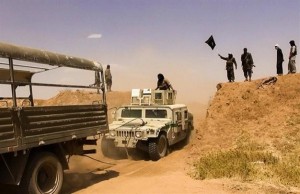Special to WorldTribune.com
WASHINGTON — Islamic State of Iraq and the Levant has seized major
U.S. combat platforms in Iraq, a report said.
The Jewish Institute for National Security Affairs asserted that ISIL,
also known as Islamic State of Iraq and Sham, acquired a huge amount of U.S.
equipment delivered to the Iraq Army.

JINSA said the Al Qaida franchise captured both U.S. ground vehicles and aircraft in the takeover of the northern Iraqi city of Mosul.
“…They [Iraqi military] left behind logistics depots filled with U.S.-made Humvees, tanks, helicopters, rockets, and countless small arms which are now all in the hands of an organization deemed too violent for Al Qaida,” the report, titled “Developments in Iraq,” said.
Author Benjamin Runkle, a former consultant to Congress and the Defense
Department, did not identify the models of the combat platforms. But over
the last five years, Washington has exported such platforms as M1A1 main
battle tanks, UH-1 Huey utility helicopters and Hellfire air-to-ground
missiles.
JINSA, deemed close to the U.S. military, also said ISIL looted as much
as $500 million from the Mosul Central Bank. The report said this made ISIL
the “wealthiest terrorist franchise ever.”
“Combined with the increased luster of a successful military campaign,
this cash in hand will enable ISIS will attract even more foreign fighters
to its banner and training camps,” the report said. “The increase in
territory controlled by ISIS also gives it greater strategic depth, and thus
greater freedom of action.”
Runkle said the huge amount of money and weapons have transformed ISIL
into a significant threat to U.S. security. But he dismissed calls for U.S.
air strikes on the network, saying the intelligence community lacked
resources in Iraq.
“First, because the U.S. withdrew almost all its intelligence collection
assets from Iraq in 2011, we do not have a good sense of whom to target,”
the report said. “Moreover, although we can likely kill a fair number of
ISIS leaders in the near-term, the lesson of our drone campaigns in Pakistan
and Yemen show that without being able to hold ground or address the
underlying causes behind the local population’s support for the terrorists,
we will likely be starting an endless cycle that may buy time but will never
be strategically decisive.”
Instead, the report urged a sustained U.S.-led campaign against ISIL.
This would include trainers, advisers, and intelligence and logistics
support to U.S. allies as well as military aid to Sunni rebels in Syria,
where ISIL has built a mini-state in the north. Runkle, however, warned
against any U.S. alliance with Iran to defeat ISIL.
“America’s regional allies are already disturbed by U.S. outreach and
concessions to Iran on nuclear-related issues,” the report said. “This
concern will only be exacerbated by any implicit partnership with Iran in
Iraq. Legitimizing Iranian intervention in Iraq will only further drive both
domestic Iraqi and regional Sunni actors away from the moderation upon which
hopes for regional stability depend.”

You must be logged in to post a comment Login